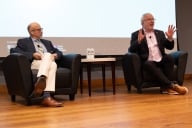You have /5 articles left.
Sign up for a free account or log in.
Three elite universities’ debates about whether they should join -- or stay with -- the massive open online course providers Coursera and edX have brought familiar concerns over revenue and intellectual property rights to the surface, even though those issues overshadow many faculty members’ and most administrators' pragmatic approach to distance education.
For Cornell, Princeton and Yale Universities, MOOCs represents a shiny new toy in the toolbox that is their online education offerings. Yale, for example, has run Open Yale Courses, a catalog of free introductory courses. Princeton publishes free lectures through iTunes U, YouTube and its Media Central, and creates programming through its alumni association. Cornell has extended its reach through eCornell, a spinoff that offers corporate training and online certificates. Adding a MOOC provider is, in other words, less of an investment and a risk than for a public institution facing dwindling public funding and calls to improve student outcomes.
Cornell is still weeks away from launching its first four MOOCs as a member of the edX consortium. But in a report released earlier this month, faculty members of its Distance Learning Committee urged a balanced approach to online education. It recommending the university “pursue a diverse portfolio of distance learning avenues, continually rebalancing it as evidence emerges.” And at faculty meetings late last year at Yale and Princeton, some instructors wondered aloud whether building courses for Coursera is worth the time and effort required to establish a presence on yet another platform.
“The more and more people think about the other kinds of potentials for distance learning, the more they think, great, let’s experiment,” said Richard W. Miller, the Wyn and William Y. Hutchinson Professor in Ethics and Public Life who was the lead researcher and writer behind the Cornell report. “Diversity is important. I have no idea what this is going to look like in five years, but it’s going to look a lot different.”
Yale, which like Cornell did not rush into MOOCs as speedily as did other elite universities, will launch its first four courses through Coursera this spring. The university is in the middle of a conversation that has played out at many institutions that have partnered with a MOOC providers. In particular, questions about revenue -- and partner Coursera’s take -- continue to stir faculty opposition.
Craig M. Wright, Henry L. and Lucy G. Moses Professor of Music, who chairs Yale’s Committee on Online Education, said the university has settled on a compromise. “The principle that we’re following is the one of faculty autonomy,” he said.
Last July, Coursera introduced Signature Track, a fee-based feature that enables students to verify their identity and receive a certificate after completing a course. Faculty members at Yale are welcome to enable Signature Track for their courses as an option, Wright said, but with one catch: The courses also have to be free and open to anyone around the world. Faculty members can skip Signature Track too, if they wish.
“The whole purpose of this online initiative is twofold,” Wright said. One goal is “to get the very best of Yale’s thinking out to the entire world. At the same time, we’re trying to use this outreach initiative as a way of learning how technology can help make us better teachers in everyone’s classroom experience.”
At Princeton, the debate centers on intellectual property rights. The university was an early Coursera adopter, joining the company during its first round of expansion in April 2012, and has another seven courses finalized for this spring and summer. Since those courses are tied to traditional semester, however, some faculty members have expressed interest in building a repository for the online materials for when the courses are not in session.
Princeton has “tens of thousands of pages of stuff that gets millions of hits a year,” said Robert Sedgewick, William O. Baker Professor in the computer science department, and it “would make a lot of sense to catalog it all.”
The idea has raised another question that has dogged debates about offering MOOCs through a third-party platform: Who owns the content? In Princeton’s case, that question is further complicated by two university-specific policies adopted when a similar debate about courseware raged years ago.
According to the Rules and Procedures of the Faculty, faculty members at Princeton own the rights to any materials they produce unless funded by the institution, but they need approval from the dean to teach at a different institution. A Coursera course, then, could arguably fall under either policy.
In Edward W. Felten’s opinion, MOOCs should be viewed as the former.
“In my view, that policy holds up really well in the current environment around MOOCs and similar materials,” Felten, professor of computer science and public affairs, said. “One can create high-tech course materials that use video and interaction with a computer, and that can be like the 21st-century version of a textbook. What this means is when it comes to the course materials that are used for teaching, those materials are more like writing, and therefore the intellectual property in the materials would be treated like a textbook.”
Princeton is not considering changing the policy, Felten said, but “I think it’s fair to say there’s a conversation about what the university should be doing in terms of platforms and ways of presenting materials.”
Many faculty members at Yale share that “platform agnostic” perspective. James Rolf, Shizuo Kakutani Lecturer in the math department, is the first on campus to use Coursera as a teaching tool. Rolf isn’t even running a MOOC, but used the platform’s video presentation and quizzing tools last fall to improve an integral calculus course that another professor said has “been driving generations of Yale students nuts.”
Early results are promising -- students in this “flipped” section of the course outperformed those in traditional courses by about a half a letter grade -- but Rolf said the numbers are superficial at this point. The experiment will be expanded to all sections of the course this semester, which in turn will produce more data about how students learn.
“I understand Coursera is a for-profit company. That doesn’t particularly bother me as long as they have good products,” Rolf said. “Can I implement what I have to do? The short answer is yes, but certainly there may be other tools that would work just as well.”
Wright listed Coursera as one of several tools when he presented a report by the online education committee at the faculty meeting in December. The thrust of the presentation, he said, was to explain the variety of options Yale is exploring.
“The point of it was that we are doing a great deal with online education that has nothing to do with what the rest of the world seems to be obsessed with,” Wright said. “Then we talked about the MOOCs as well.”








